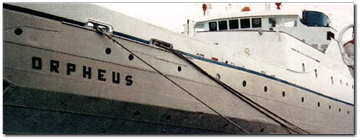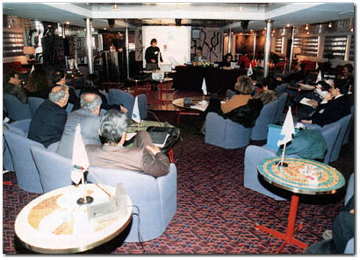1997 Piraeus (Hellenic Republic), 3rd conference - OUTLINE
- Period: March 20-21, 1997
- Venue: The cruise ship "Orpheus"
PROFILE OF PIRAEUS
 Piraeus, or Peiraeus is a city in the periphery of Attica, Greece, located south of Athens. It is the capital of the Piraeus Prefecture. It was the port of the ancient city of Athens, and was chosen to serve as the modern port when Athens was re-founded in 1834. Piraeus remains a major shipping and industrial centre, and is the terminus for Line 1 (the "green line"), the electric train service now incorporated into the Athens Metro.
Piraeus, or Peiraeus is a city in the periphery of Attica, Greece, located south of Athens. It is the capital of the Piraeus Prefecture. It was the port of the ancient city of Athens, and was chosen to serve as the modern port when Athens was re-founded in 1834. Piraeus remains a major shipping and industrial centre, and is the terminus for Line 1 (the "green line"), the electric train service now incorporated into the Athens Metro.
(From Wikipedia, the free encyclopedia)
SCHEDULE
1997 |
|
|
 |
Mar. 20
(Thu.) |
morning |
Opening Ceremony
Press Conference
|
afternoon |
Mayors' session
Experts' session
Meeting of
the Directorial Cities |
evening |
Dinner |
Mar. 21
(Fri.) |
morning |
Mayors' session
Experts' session
|
afternoon |
Plenary Session
Closing Ceremony |
evening |
Dinner |
MEETING OF MAYORS
The mayors who participated in the meeting can convey these experiences to their technical experts in their cities and investigate to what extent international experiences and solutions can solve local problems.
<Osaka>
The senior advisor to the Mayor of Osaka, Mr. KAZUNE IHDA, reported in detail about the plans for the New City of Water Osaka and the "City Attractive to International Visitors" program. He also discussed Osaka's future city planning, giving useful information about the usage of water for environmental conservation, and he presented excellent examples of cityscape designs providing access to water.
He presented also public facility development in Osaka, waterfront amenities, and the concept of promotion of exchange through the usage of water. Among such projects and events, Osaka is bidding to host the Olympic Games in the year 2008.
<Piraeus>
The Mayor of Piraeus, STELIOS LOGOTHETIS, discussed the Piraeus programme for rehabilitation of the Saronic Gulf, the integrated biological treatment installation on the Piraeus island of Psyttalia, the recycling possibilities of waste water, and the re-operation of tourist beaches.
<Shanghai>
The deputy secretary general of the Shanghai Municipal Government, HUNG YUE JIN, offered a full description of the Shanghai Suzhou Creek Rehabilitation Project.
In order to ensure implementation of the management plan for Suzhou Creek, SMG prepared the contract of preferential policy for the comprehensive use and development of the land along the banks.
The management implemented by SSCRPHO in the city proper is stricter than that in other areas of the city in order to guarantee good results from the rehabilitation work. The management foundation of Suzhou Creek, Shanghai, will be set up. All interested societies and people will be made aware of and help to finance this project.
The rehabilitation of Suzhou Creek will cost over 20 billion RMB. SMG hopes and encourages governments, banks, large financial organizations and large groups all over the world to provide funding and technology in the form of lower-interest loans, grants, technical assistance and cooperative development.
Under the leadership of SMG and the care and support of the people of Shanghai and overseas, we are sure that the targets of comprehensive pollution control of Suzhou Creek will be achieved. A new Suzhou Creek will be appearing in the next century.
<Hamburg>
Environmental policy developments and problems in Hamburg were analyzed by Dr. Fritz Vahrenholt, Head of the State Ministry of Environment of Hamburg-Germany.
The social and socio-geographic polarization trends in the city cause further problems, which have to be counteracted by political measures. Developments and improvements in environmental policy have been achieved, such as the reduction of air polluting emissions, the reduction of influence from factories and sewage works, lowering water consumption, an increase in recycling cleaning Hamburg's water, and groundwater conservation.
<Larnaca>
As an outcome of the presentation delivered by the Mayor of Larnaca (Cyprus), we considered:
1. The necessity to have integrated development plans, which take into consideration the historic particularities, social facts and, economic activities of the coastal areas. The existence of an institutional framework that makes these development plans legal and valid.
2. The funding of local authorities by governments to promote and implement development plans in ports.
3. The conflict of the port and tourist activities developed in the coastal areas.
4. The high concentration of population in the coastal areas that led to urban problems related to the sufficiency and quality of the services provided such as water, sewage management of rain water more acute.
<Taganrog>
The systems of technogenesis safety of towns' and regions' objects were presented briefly by the deputy Mayor of Taganrog, Mr. IONOV.
<Varna>
Mrs. KANCHEVA IVANOVA MARIANA, representative of the Mayor of Varna, discussed the Eutrophication and Blossoming of the Black Sea, providing recommendations for controlling the pollution.
RADOUL KOVATCHEV, General Secretary of the Black Sea Club, discussed the corresponded institution of the Black Sea organization.
<Odessa>
Mr. KODISKI, the representative of Odessa, discussed the local water problems of Odessa. All the cities presented high level technology and projects of common interest, which can be evaluated by their own experts and further elaborated through visits and first hand experience of local solutions.
Experts' session
<Coastal Areas>
The delicate and fragile balance between the natural and socioeconomic parameters that have an impact on the coastal zone and the seafront has the common theme in all the talks. Even the slightest disturbance of one of those parameters could result in a major disturbance in the balance, which many times is not reversible.
Up-to-date methods concerning the study of the seafront and its balance, i.e. such as the Geographical Information Systems, the field measurements of the natural - chemical parameters, etc., are now implemented in all the geographical longitudes and latitudes.
The number of crises in the seafront (environmental stability, natural disasters, etc.) increase constantly. Due to the great economic importance of the coastal zone, proper measurements and the necessary planning for each district should be taken in order to manage these crises. Cooperation among local authorities, centers for specialized research, and university centers in various countries, is the route that will lead to the rational resolution of the problems concerning the seafront.
<Water resources-Technical infrastructure-Flood-Water quality-Environment, Drought>
The unified planning based on up-to-date criteria and the rational hierarchy of priorities regarding technical structures must be the responsibility of only one state authority, so that comprehensive programs can be implemented and adverse phenomena such as non-continuity of the water currents can be avoided.
Flood prevention planning should precede urban planning so that the problems can be addressed rationally and substantially, either in the case of average precipitation or storms.
Methods of analysis with respect to precipitation measurements should be reviewed in order to enable us to estimate the data and obtain better knowledge regarding the phenomenon. Water measurements in the torrent basins, experimental basin for the observation of the correlation between rain and runoff in an urban environment, will allow us to obtain a greater respect for the natural options.
The structuring of major technical projects such as the ones for urban and industrial waste management has as their main environmental impact, a substantial decrease of pollution in sea or river waters which receive these samples, and such results are shown in the chemical analyses of these bodies of water.
The complete and systematic monitoring of the quality of water that is intended for various uses and particularly for human consumption, is imperative. The necessary technical and scientific infrastructure must enable the systematic monitoring of the surface and ground water. Quality standards must be determined and the proper intervention must be made so that the quality of water is preserved within the set boundaries.
» More Details..
MEETING OF THE DIRECTORIAL CITIES
 The Directorial cities are the following: Birmingham, Belgrade, Chicago, Hamburg, Melbourne, Montreal, Piraeus, Sendai, Shanghai, Venice, Vienna and Osaka. The discussions went on with the selection of the city to host the next conference of ICAP, which in accordance with the Constitution, takes place every three (3) years. The next conference will take place in the year 2000. A proposal was made to have Vienna host the 4th conference. Vienna expressed the wish to undertake the necessary procedures for the 4th conference. The proposal was unanimously accepted. Being ICAP's Secretariat, we will take all necessary steps so that this conference will also be successful and we hope to have your cooperation.
The Directorial cities are the following: Birmingham, Belgrade, Chicago, Hamburg, Melbourne, Montreal, Piraeus, Sendai, Shanghai, Venice, Vienna and Osaka. The discussions went on with the selection of the city to host the next conference of ICAP, which in accordance with the Constitution, takes place every three (3) years. The next conference will take place in the year 2000. A proposal was made to have Vienna host the 4th conference. Vienna expressed the wish to undertake the necessary procedures for the 4th conference. The proposal was unanimously accepted. Being ICAP's Secretariat, we will take all necessary steps so that this conference will also be successful and we hope to have your cooperation.
Regarding the improvement of the newsletter of the «Aquapolises» issued by the Secretariat, it was decided that the cities members will exchange information through articles about planning works and other information related to water and green areas. In order to implement this decision, the Secretariat invites all of members of ICAPS to participate in this effort by submitting various articles. In addition, if members of ICAPS wish other matters to be included in the newsletter, please do not hesitate to get in touch with the Secretariat in OSAKA.
PIRAEUS DECLARATION
 At the end of the MEETING OF THE DIRECTORIAL CITIES, we dealt with the draft declaration of Piraeus, which was approved. The declaration will be announced next by the Towns of Piraeus.
At the end of the MEETING OF THE DIRECTORIAL CITIES, we dealt with the draft declaration of Piraeus, which was approved. The declaration will be announced next by the Towns of Piraeus.
» PIRAEUS DECLARATION
ATTENDANCE
- Argostolion
- Athens
- Belgrade
- Ceres
- Hamburg
- Hiaba
- Larnaca
- Lonioi
- Mariupol
- Milos
- Nafplio
- Odessa
- Osaka
- Paris
- Piraeus
- Ptolemais
- Rostv na Donu
- Shanghai
- Sparti
- Taganrog
- Varna
- Vienna



 Piraeus, or Peiraeus is a city in the periphery of Attica, Greece, located south of Athens. It is the capital of the Piraeus Prefecture. It was the port of the ancient city of Athens, and was chosen to serve as the modern port when Athens was re-founded in 1834. Piraeus remains a major shipping and industrial centre, and is the terminus for Line 1 (the "green line"), the electric train service now incorporated into the Athens Metro.
Piraeus, or Peiraeus is a city in the periphery of Attica, Greece, located south of Athens. It is the capital of the Piraeus Prefecture. It was the port of the ancient city of Athens, and was chosen to serve as the modern port when Athens was re-founded in 1834. Piraeus remains a major shipping and industrial centre, and is the terminus for Line 1 (the "green line"), the electric train service now incorporated into the Athens Metro. 
 The Directorial cities are the following: Birmingham, Belgrade, Chicago, Hamburg, Melbourne, Montreal, Piraeus, Sendai, Shanghai, Venice, Vienna and Osaka. The discussions went on with the selection of the city to host the next conference of ICAP, which in accordance with the Constitution, takes place every three (3) years. The next conference will take place in the year 2000. A proposal was made to have Vienna host the 4th conference. Vienna expressed the wish to undertake the necessary procedures for the 4th conference. The proposal was unanimously accepted. Being ICAP's Secretariat, we will take all necessary steps so that this conference will also be successful and we hope to have your cooperation.
The Directorial cities are the following: Birmingham, Belgrade, Chicago, Hamburg, Melbourne, Montreal, Piraeus, Sendai, Shanghai, Venice, Vienna and Osaka. The discussions went on with the selection of the city to host the next conference of ICAP, which in accordance with the Constitution, takes place every three (3) years. The next conference will take place in the year 2000. A proposal was made to have Vienna host the 4th conference. Vienna expressed the wish to undertake the necessary procedures for the 4th conference. The proposal was unanimously accepted. Being ICAP's Secretariat, we will take all necessary steps so that this conference will also be successful and we hope to have your cooperation.  At the end of the MEETING OF THE DIRECTORIAL CITIES, we dealt with the draft declaration of Piraeus, which was approved. The declaration will be announced next by the Towns of Piraeus.
At the end of the MEETING OF THE DIRECTORIAL CITIES, we dealt with the draft declaration of Piraeus, which was approved. The declaration will be announced next by the Towns of Piraeus.